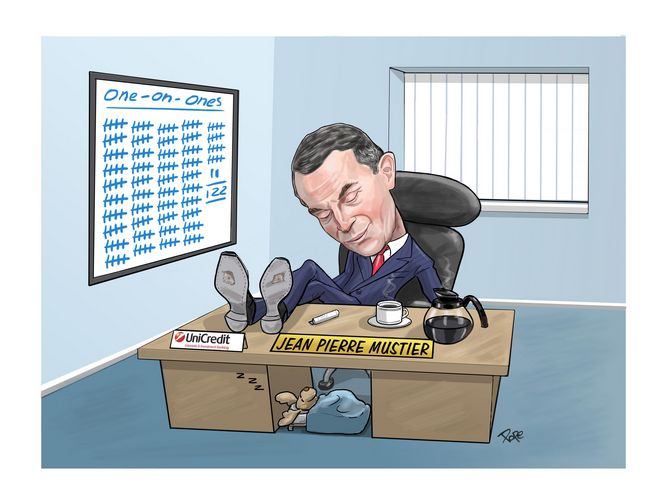Globetrotter
UniCredit’s rapid transformation under chief executive Jean Pierre Mustier was a remarkable feat. He convinced stakeholders that his plan was right and led from the front in selling it worldwide in a rapid sequence of transactions. UniCredit’s recapitalisation is IFR’s Financing Package of the Year.
When UniCredit’s new chief executive Jean Pierre Mustier came knocking for €13bn from equity investors they knew the drill. Mustier made it three different UniCredit CEOs who had launched four capital raisings to fund five overhauls.
Investors hadn’t exactly been rewarded for their faith, though, with the €14.5bn raised in the previous three capital raisings resulting in a market capitalisation of around €15bn.
To make matters worse, Italian politics were in turmoil, several other Italian banks were in deepening trouble and the rights issue at the centre of the plan would only work if it was huge (in the end it was the largest European ECM deal since 2009).
“The rights issue by Monte dei Paschi di Siena had pulled back and there was no government – yet this was still the right moment,” said UniCredit’s global head of ECM Stefania Godoli.
Mustier had been in place for less than six months when he announced the rights issue in December. The deal is IFR’s EMEA Secondary Equity Issue of the Year. Crucially, his pitch to investors differed from those of most bank CEOs. Where other European banks have typically focused on future growth (and minimised fundraisings with planned disposals that years later still haven’t taken place), UniCredit was making no grand promises about the future. The best Mustier could do was reassure investors by pointing to the progress made already.
But reassure he did. In fact, he pulled off one of the most impressive sales efforts in recent banking history. Criss-crossing the world to meet investors, he held 122 one-on-one meetings. Many of those on the receiving end of the former paratrooper’s charm and energy came out of the meetings entirely convinced.
Olivier Khayat, co-CEO of UniCredit’s investment bank, watched the show from close quarters. “He was amazing. I’ve never seen anything quite like it,” he said.
But the rights issue was only the crescendo in a financing package that also comprised accelerated bookbuilds, a mandatory exchangeable, Additional Tier 1 and Tier 2 bonds and the disposal of non-performing loans via an ABS deal. For once, a project name that included a date – Transform 2019 – was not wildly over-optimistic.
NO TIME TO SETTLE IN
The process began days after Mustier’s arrival in July 2016. In his first week, the bank sold down part of its stakes in online brokerage FinecoBank and Poland’s Bank Pekao to raise €1.08bn. The trades came on consecutive nights in July – Fineco on Monday and Pekao on Tuesday – and the action was welcomed by the market as UniCredit shares rose 14% over the week.
The momentum was maintained with another accelerated sale of Fineco in October – this time for 20% in one go – to raise €552m. The three sales had added 32bp to UniCredit’s CET1 ratio.
These sales were laying the groundwork that would allow Mustier to launch a rights issue billions in excess of expectations without spooking investors.
THE ADVENT OF NEW UNICREDIT
December was the crucial period in which UniCredit changed its narrative in a matter of days even as the Italian government collapsed.
On December 8, the disposal of the remaining stake in Bank Pekao was completed to boost CET1 by 61bp. PZU and the Polish Development Fund (PFR) bought 32.8% for US$2.5bn-equivalent at the same time as 7.3% was sold through an innovative mandatory exchangeable bond.
UniCredit wanted to sell its whole stake but PZU and PFR couldn’t buy any more without triggering a takeover bid. UniCredit was also constrained in selling elsewhere because the discount necessary would mean pricing below where the strategic buyers came in.
And with the rights issue about to be announced, the Italian bank couldn’t do a traditional exchangeable bond because it didn’t want to pay a coupon. Just to add to the complexity, there had never been a bond convertible into Polish stock before and unlike all European mandatories that have gone before it, there could be no delta placing to help hedge fund buyers.
The solution came in the form of a certificate structure that amounts to a forward sale. In an echo of a structure commonly used with Italian retail offerings, instead of a coupon investors would receive 81% of dividends paid on the stock over the three-year life. To give investors a return the bonds were placed at 85.85% of nominal value.
The following week UniCredit’s asset management arm Pioneer Investments was sold to Amundi for €3.345bn (a 78bp uplift to CET1) and a day later the bank held a capital markets day at which it announced a €13bn rights issue and sale of €17.7bn of NPLs.
Before the announcement, the consensus among analysts was that the rights issue would be below €10bn (in November the consensus had been that it would not top €8bn) yet shares rallied 15.9% on the day.
FINO
The sale of NPLs, meanwhile, had come with a fate-tempting project name “failure is not an option”, or FINO, yet in snaring Pimco and Fortress Investment Group as backers UniCredit had a new mark for all of its problem assets, a vital step in showing that the recapitalisation rights issue really would be the last.
Maintaining the momentum, UniCredit raised €500m through Additional Tier 1 notes the next day. The choreography of three major events in three days shows the intricate planning seen throughout the financing process.
The AT1 was UniCredit’s first in two years and is the smallest part of the financing package but the most controversial. The club deal carried a 9.25% coupon for the perpetual non-call June 2022s. The bank had held off issuing AT1s while most European banks had been steadily chipping away at their AT1 funding needs. A few steps behind, UniCredit was very generous to the lucky few that received bonds in the club deal. The bonds quickly rose to 105.
Some market participants have suggested the combination of club deal and surging aftermarket performance make the deal suspect – though they are unable to be more precise. While the headline coupon was generous, it reflected a new issue premium of only 25bp–35bp to where the non-call 2021s were trading at the time, which seemed reasonable compensation considering the lack of offering memorandum and the time of year.
Certainly, the club route didn’t achieve the best price but a marketed offering would have been a risk as it was hard to gauge where it would be priced, especially as at that point there hadn’t been a euro-denominated AT1 in more than six months.
The sharp rise in the bonds also simply reflected just how quickly the UniCredit story was changing as the non-call 2021s rallied nearly three points during the week.
A public AT1 followed in May when UniCredit had banked the proceeds from the rights issue and so was a different story. The €1.25bn perpetual came with a coupon of 6.625% – inside the 6.75% of the previous public deal in 2014 – and yet investors bought as they saw further spread compression to come.
In the end, the rights issue was a breeze despite the lack of major shareholders and a decision not to promote the offering to retail shareholders. Take-up reached 99.8%, one of the highest ever seen.
In the process Mustier won fans not just on the buyside but also made himself the poster boy for ECM teams across Europe.
UniCredit, Morgan Stanley and UBS were structuring advisers and joint global coordinators on the rights issue with Bank of America Merrill Lynch, JP Morgan and Mediobanca, but the final syndicate was a 30-strong group ensuring there was room for nearly every bank that claims to do ECM in Europe.
As an investment banker Mustier appreciated the risks those banks bore and delighted them twice. First, by paying fees of 3%–3.5% that pretty much matched the entire fees paid in European ECM in the first quarter of 2016 and then by giving the banks plenty of breathing room with a discount to the theoretical ex-rights price of 38%.
“Whether investors asked about high-level strategy or low-level numbers, Mustier had it all cold,” said a banker at one of the top-level banks on the rights issue. “We put billions at risk because we believed in the plan. He took advice, paid us and moved very quickly.”
The progress made in a short period of time were summed up by Mirko Bianchi, the bank’s CFO. ”Thanks to the decisive actions taken in the last 12 months, we have a solid capital position and we have also repositioned UniCredit’s credit profile with spreads tightening significantly, both on an absolute and relative basis. We continue to fully focus on achieving our Transform 2019 targets,” he said.
To see the digital version of this review, please click here.
To purchase printed copies or a PDF of this review, please email gloria.balbastro@tr.com.



